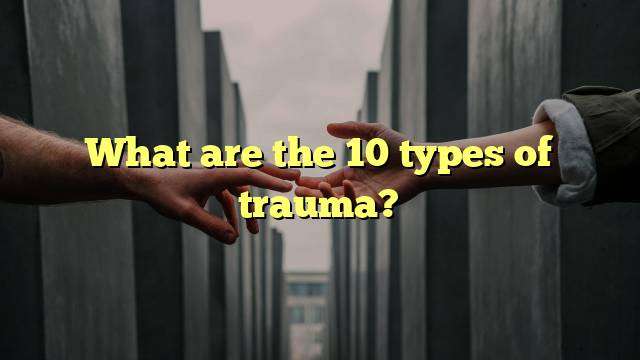What are the 10 Types of Trauma?
Trauma is an emotional response to a frightening or stressful situation that lingers long after the event has passed. The effects of trauma can be physical, psychological, and social, affecting individuals, families, and communities. It is important to understand the different types of trauma, as they can help to identify the root cause of symptoms, as well as provide a framework for treatment and recovery.
Physical Abuse
Physical abuse is any intentional act of physical force or violence upon a person, including hitting, kicking, pushing, or restraining. It can involve physical harm, threat of physical harm, or even the fear of physical harm. Physical abuse can have long-lasting effects on a person’s mental and emotional health, including feelings of fear, guilt, and shame.
Sexual Abuse
Sexual abuse is any kind of non-consensual sexual contact or activity, including rape, sexual assault, and sexual exploitation. It is an act of power and control, and can have a devastating impact on an individual’s mental and emotional well-being. Survivors of sexual abuse may struggle with feelings of guilt, shame, and betrayal, as well as physical and emotional pain.
Emotional Abuse
Emotional abuse is any kind of behavior that is intended to manipulate, control, or belittle another person. Common forms of emotional abuse include name-calling, belittling, intimidation, and threats. Emotional abuse can have long-lasting, damaging effects on a person’s self-esteem, sense of worth, and mental health.
Physical Neglect
Physical neglect is the failure to provide adequate nutrition, clothing, shelter, and medical care for a child or other dependant. It can involve direct physical harm, such as withholding food or medical care, or it can involve indirect physical harm, such as failing to provide adequate shelter or clothing. Physical neglect can have a profound impact on a person’s physical and emotional health, leading to feelings of shame, guilt, and worthlessness.
Emotional Neglect
Emotional neglect is the failure to provide emotional support, attention, and affection. It includes ignoring a child’s needs, withholding praise and encouragement, and failing to provide emotional guidance and support. Emotional neglect can lead to feelings of loneliness, isolation, and insecurity.
Mental Illness
Mental illness is a psychological disorder that affects a person’s thoughts, emotions, and behavior. Mental illness can be caused by a variety of factors, including genetics, environment, and trauma. It can lead to changes in a person’s behavior, thoughts, and emotions, and can have a profound impact on a person’s mental and emotional health.
Divorce
Divorce is the legal dissolution of a marriage. It is a difficult and emotional process for both parties involved, and can have a lasting impact on individuals, families, and communities. Divorce can lead to feelings of sadness, guilt, and anger, as well as changes in family dynamics and relationships.
Substance Abuse
Substance abuse is the use of drugs, alcohol, or other substances in a way that is harmful to oneself or others. Substance abuse can have serious physical, psychological, and social consequences, including addiction, health problems, and strained relationships.
Domestic Violence
Domestic violence is a pattern of physical, psychological, or emotional abuse within an intimate relationship. It can involve physical violence, sexual abuse, emotional abuse, or even financial control. Domestic violence can have a devastating impact on individuals, families, and communities, leading to feelings of fear, shame, and guilt.
War and Conflict
War and conflict can have a profound effect on individuals, families, and communities. Exposure to violence, death, and destruction can lead to long-term psychological trauma and can have a lasting impact on mental and emotional health.
Trauma can take many forms, but understanding the different types of trauma can help to identify the root cause of symptoms and provide a framework for treatment and recovery. If you or someone you know is experiencing any of the types of trauma listed above, it is important to seek help from a professional mental health provider. There are a variety of resources available to help survivors of trauma, including counseling, support groups, and trauma-focused therapies. With support and guidance, it is possible to heal from the effects of trauma and move forward in life.



